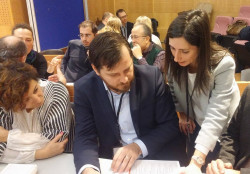Sharing experiences and illuminating ideas: the CITyFiED community comes together
From Avila to Tartu and Botkyrka to Udine, the vast number of differences is clear. Hearing each speak, climate, population, demographics, budgets, financing and ownership models as well as the precise nature of their individual energy efficiency targets were as diverse as their languages and cultures. Governance, too, was quite different with local leadership on energy issues falling to everything from agency style incubators to regional energy ministries and entrepreneurial local authorities. However, their desire to give recognised leadership in the European drive for smarter cities and energy efficiency brought them all together under the CITyFiED community for a lively exchange and study tour. In preparing the meeting and aiding CITyFiED replication work, 10 of the project’s cluster cities conducted interviews and workshops with stakeholders on non-technical barriers and better identify future solutions. These were then built upon in presentations and open discussions. As often the case, another common factor was mobilising the high investment costs needed to transform building stock and deliver energy innovation. Long payback periods and lack of financial incentives can be a hindrance for single buildings, let alone whole districts and cities. For some, a crisis in the real estate market or even – almost ironically – a mild climate were highlighted as additional factors making profitability and payback of energy retrofitting investments even more challenging. Public-private partnerships with energy service companies or energy saving contracting were common; but many advocated looking at finance in the bigger picture. This included reducing costs through district level purchasing and synergies or integrating other energy efficient interventions such as public lightning and sustainable mobility. Many from the CITyFiED community also highlighted the importance of fiscal incentives and benefits. Here, low interest loans, citizen crowd sourcing, ethical investment funds and grouped purchasing of installations and services were some of the creative elements used. If financing is complicated and critical, then social acceptance also fitted the bill. A lack of awareness and interest; difficulty to communicate and involve residents and potentially major roadblocks to make a project time-consuming and expensive were all raised in a series of open discussions on non-technical barriers held in advance of the meeting as part of CITyFiED’s replication work. Starting the dialogue early and maintaining it often with a range of events and opportunities to contribute seemed to give the best results, but varied ownership across apartments and limited professional communication skills, especially in smaller organisations, kept this issue on high alert among the cities. A sharing session with speakers from Spain, Sweden, Estonia, Italy and Turkey built on all these insights. Raimond Tamm from Tartu and the SmartEnCity project underlined the need for tangible solutions and achievements. For him, doing is convincing and residents need practical and substantiated reference cases to be convinced about the benefit of energy retrofitting. In Turkey, managing political, social and economic risks and understanding different points of view and their potential outcomes was good project management practice for all initiatives. Professor Gianfranco Rizzo from Salerno stressed the city needed a strong multi-disciplinary approach to meet the many societal and environmental challenges ahead. This included everything from storage and micro-generation, to solar roofing and solidarity purchasing groups. Read more at: http://www.cityfied.eu/News/ArticlesInterviews/Sharing-Experiences-And-Illuminating-Ideas-The-CITyFiED-Community-Comes-Together.kl
Keywords
retrofitting, replication, experience, smart cities, energy efficiency
Countries
Spain



